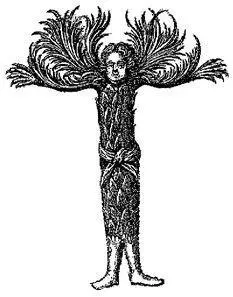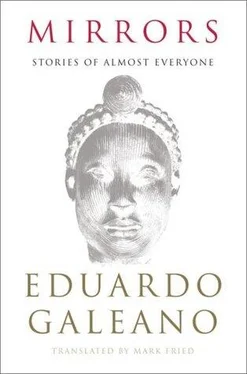“Why the shape of his head is quite altered!”
He brought back more than tortoises. He brought questions. His head was teeming with questions.


Why does the wooly mammoth have a thick coat? Could the mammoth be an elephant that found a way to stay warm when the ice age set in?
Why is the giraffe’s neck so long? Could it be because over time it got stretched in order to reach fruit high in the treetops?
Were the rabbits that run in the snow always white, or did they become white to fool the foxes?
Why does the finch have a different beak depending on where it lives? Could it be that their beaks adapted bit by bit to the environment through a long evolutionary process, so they could crack open fruits, catch larvae, drink nectar?
Does the incredibly long pistil of the orchid indicate that there are butterflies nearby whose remarkably long tongues are as long as the pistil that awaits them?
No doubt it was a thousand and one questions like these which, with the passage of years and doubts and contradictions, became the pages of his explosive book on the origin of the species and the evolution of life in the world.
Blasphemous notion, intolerable lesson in humility: Darwin revealed that God did not create the world in seven days, nor did He model us in his image and likeness.
Such horrible news was not well received. Who did this fellow think he was to correct the Bible?
Samuel Wilberforce, bishop of Oxford, asked Darwin’s readers:
“Are you descended from the apes on your grandfather’s side or your grandmother’s?”

Darwin liked to cite James Coleman’s travel notes.
No one better described the fauna of the Indian Ocean,
the sky above flaming Vesuvius,
the glow of Arabian nights,
the color of the heat in Zanzibar,
the air in Ceylon, which is made of cinnamon,
the winter shadows of Edinburgh,
and the grayness of Russian jails.
Preceded by his white cane, Coleman went around the world, from tip to toe.
This traveler, who did so much to help us see, was blind.
“I see with my feet,” he said.

Darwin told us we are cousins of the apes, not the angels. Later on, we learned we emerged from Africa’s jungle and that no stork ever carried us from Paris. And not long ago we discovered that our genes are almost identical to those of mice.
Now we can’t tell if we are God’s masterpiece or the devil’s bad joke. We puny humans:
exterminators of everything,
hunters of our own,
creators of the atom bomb, the hydrogen bomb, and the neutron
bomb, which is the healthiest of all bombs since it vaporizes people and
leaves objects intact,
we, the only animals who invent machines,
the only ones who live at the service of the machines they invent,
the only ones who devour their own home,
the only ones who poison the water they drink and the earth that
feeds them,
the only ones capable of renting or selling themselves, or renting or
selling their fellow humans,
the only ones who kill for fun,
the only ones who torture,
the only ones who rape.
And also
the only ones who laugh,
the only ones who daydream,
the ones who make silk from the spit of a worm,
the ones who find beauty in rubbish,
the ones who discover colors beyond the rainbow,
the ones who furnish the voices of the world with new music,
and who create words so that
neither reality nor memory will be mute.

It happened in Washington in 1840.
A government census measured dementia among blacks in the United States.
According to the census, there were nine times as many cases among free blacks as among slaves.
The North was a vast insane asylum, and the farther north one went the worse it got. Going from north to south, however, one went from lunacy to sanity. Among the slaves who worked the prosperous cotton, tobacco, and rice plantations, madness barely existed.
The census reaffirmed the master’s convictions. The fine medicine of slavery developed moral equilibrium and good judgment. Freedom, in contrast, churned out nutcases.
In twenty-five northern cities, not a single sane black person was found, and in thirty-nine cities in the state of Ohio and twenty in New York, the number of black mental cases outnumbered the total black population.
The census might seem dubious, yet it was taken as the official truth for a quarter of a century, until Abraham Lincoln freed the slaves, won the war, and lost his life.

It happened in 1880.
For years John Sutter shuffled all over the Capitol and the White House wearing a threadbare colonel’s uniform and hauling a bag full of documents. When by some miracle he found someone willing to listen, he pulled out his deeds to the city of San Francisco and its vast surroundings, and told the story of the millionaire undone by the gold rush.
He had founded his empire in the Sacramento Valley, where he purchased numerous Indian vassals and the title of colonel and a Pleyel piano. Then gold sprouted like wheat and his lands and homes were invaded, his cattle and sheep eaten, and his crops ruined.
He lost everything, and from then on spent his life in court. When a judge ruled in his favor, a crowd set fire to the courthouse.
He moved to Washington.
There he lived hoping, and hoping he died.
Now a street in San Francisco bears his name.
Consolation arrived late.

It happened in Boston in 1882.
The New England Society for the Suppression of Vice blocked distribution of the second edition of Leaves of Grass.
A few years earlier, after the first edition came out, the author lost his job.
Public morality would not tolerate Walt Whitman’s effusive praise of the pleasures of the night.
That was the case even though Whitman managed to hide what was most forbidden. In one passage, Leaves of Grass insinuates something, but in the remainder and even in his intimate diaries he took the trouble to change “his” to “her” and to put “she” where he had written “he.”
The great poet, who celebrated resplendent nudity, had no choice but to disguise himself to survive. He invented six children he never had, lied about romances with women who never existed, and painted himself as the bearded tough guy who embodied American virility, plowing virgin fields and untouched girls.

It happened in Amherst in 1886.
When Emily Dickinson died, the family discovered eighteen hundred poems hidden in her bedroom.
On tiptoe she lived, and on tiptoe she wrote. She published only eleven poems in her entire lifetime, all anonymously or under a pseudonym.
Читать дальше




















